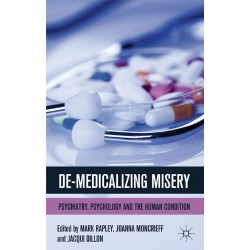via: Jaqui Dillon: Hearing Voices Trauma and Dissociation Trainer
Demedicalizing Misery: Psychiatry, Psychology and the Human Condition

Co-Edited by: Mark Rapley,
Joanna Moncrieff and Jacqui Dillon
publication date: September 28, 2011 Publisher: Palgrave Macmillan
"Thomas Szasz (1960) suggested that the myth of ‘mental illness’ functions to ‘render more palatable the bitter pill of moral conflict in human relations.’ The medicalization of distress enables the mental health professions to manage the human suffering that they are confronted with, and also the suspicion that there is little that they can do to help. But the medicalization of misery and madness renders people unable to comprehend their experiences in ordinary, meaningful terms. In this collection we restore to everyday discourse a way of understanding distress that, unlike contemporary psychiatry and psychology, recognises and respects the essential humanness of the human condition. De-medicalizing Misery is a shorthand term for this project. The book resists the psychiatrization and psychologization of human experience, and seeks to place what are essentially moral and political – not medical – matters back at the centre of our understanding of human suffering." read the rest
"Thomas Szasz (1960) suggested that the myth of ‘mental illness’ functions to ‘render more palatable the bitter pill of moral conflict in human relations.’ The medicalization of distress enables the mental health professions to manage the human suffering that they are confronted with, and also the suspicion that there is little that they can do to help. But the medicalization of misery and madness renders people unable to comprehend their experiences in ordinary, meaningful terms. In this collection we restore to everyday discourse a way of understanding distress that, unlike contemporary psychiatry and psychology, recognises and respects the essential humanness of the human condition. De-medicalizing Misery is a shorthand term for this project. The book resists the psychiatrization and psychologization of human experience, and seeks to place what are essentially moral and political – not medical – matters back at the centre of our understanding of human suffering." read the rest


No comments:
Post a Comment